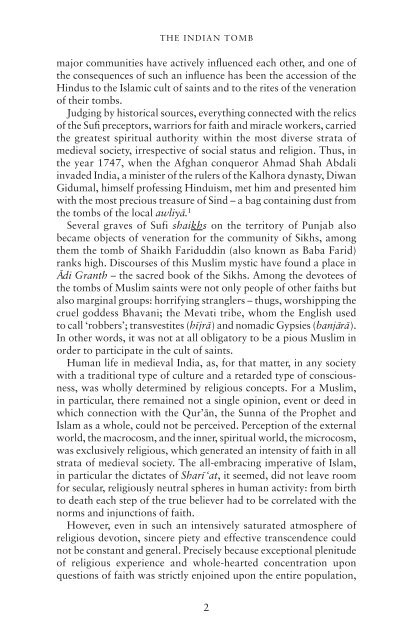Muslim Saints of South Asia: The eleventh to ... - blog blog blog
Muslim Saints of South Asia: The eleventh to ... - blog blog blog
Muslim Saints of South Asia: The eleventh to ... - blog blog blog
Create successful ePaper yourself
Turn your PDF publications into a flip-book with our unique Google optimized e-Paper software.
THE INDIAN TOMB<br />
major communities have actively influenced each other, and one <strong>of</strong><br />
the consequences <strong>of</strong> such an influence has been the accession <strong>of</strong> the<br />
Hindus <strong>to</strong> the Islamic cult <strong>of</strong> saints and <strong>to</strong> the rites <strong>of</strong> the veneration<br />
<strong>of</strong> their <strong>to</strong>mbs.<br />
Judging by his<strong>to</strong>rical sources, everything connected with the relics<br />
<strong>of</strong> the Sufi precep<strong>to</strong>rs, warriors for faith and miracle workers, carried<br />
the greatest spiritual authority within the most diverse strata <strong>of</strong><br />
medieval society, irrespective <strong>of</strong> social status and religion. Thus, in<br />
the year 1747, when the Afghan conqueror Ahmad Shah Abdali<br />
invaded India, a minister <strong>of</strong> the rulers <strong>of</strong> the Kalhora dynasty, Diwan<br />
Gidumal, himself pr<strong>of</strong>essing Hinduism, met him and presented him<br />
with the most precious treasure <strong>of</strong> Sind – a bag containing dust from<br />
the <strong>to</strong>mbs <strong>of</strong> the local awliyā. 1<br />
Several graves <strong>of</strong> Sufi shaikhs on the terri<strong>to</strong>ry <strong>of</strong> Punjab also<br />
became objects <strong>of</strong> veneration for the community <strong>of</strong> Sikhs, among<br />
them the <strong>to</strong>mb <strong>of</strong> Shaikh Fariduddin (also known as Baba Farid)<br />
ranks high. Discourses <strong>of</strong> this <strong>Muslim</strong> mystic have found a place in<br />
Ādi Granth – the sacred book <strong>of</strong> the Sikhs. Among the devotees <strong>of</strong><br />
the <strong>to</strong>mbs <strong>of</strong> <strong>Muslim</strong> saints were not only people <strong>of</strong> other faiths but<br />
also marginal groups: horrifying stranglers – thugs, worshipping the<br />
cruel goddess Bhavani; the Mevati tribe, whom the English used<br />
<strong>to</strong> call ‘robbers’; transvestites (hījrā) and nomadic Gypsies (banjārā).<br />
In other words, it was not at all obliga<strong>to</strong>ry <strong>to</strong> be a pious <strong>Muslim</strong> in<br />
order <strong>to</strong> participate in the cult <strong>of</strong> saints.<br />
Human life in medieval India, as, for that matter, in any society<br />
with a traditional type <strong>of</strong> culture and a retarded type <strong>of</strong> consciousness,<br />
was wholly determined by religious concepts. For a <strong>Muslim</strong>,<br />
in particular, there remained not a single opinion, event or deed in<br />
which connection with the Qur’ān, the Sunna <strong>of</strong> the Prophet and<br />
Islam as a whole, could not be perceived. Perception <strong>of</strong> the external<br />
world, the macrocosm, and the inner, spiritual world, the microcosm,<br />
was exclusively religious, which generated an intensity <strong>of</strong> faith in all<br />
strata <strong>of</strong> medieval society. <strong>The</strong> all-embracing imperative <strong>of</strong> Islam,<br />
in particular the dictates <strong>of</strong> Sharī ‘at, it seemed, did not leave room<br />
for secular, religiously neutral spheres in human activity: from birth<br />
<strong>to</strong> death each step <strong>of</strong> the true believer had <strong>to</strong> be correlated with the<br />
norms and injunctions <strong>of</strong> faith.<br />
However, even in such an intensively saturated atmosphere <strong>of</strong><br />
religious devotion, sincere piety and effective transcendence could<br />
not be constant and general. Precisely because exceptional plenitude<br />
<strong>of</strong> religious experience and whole-hearted concentration upon<br />
questions <strong>of</strong> faith was strictly enjoined upon the entire population,<br />
2


